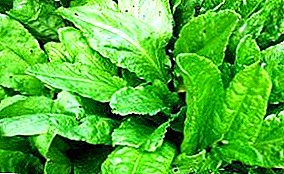 Cherry tomatoes belong to a tall, early-ripening variety of tomato, usually red, although varieties with yellow, green and even black can be found.
Cherry tomatoes belong to a tall, early-ripening variety of tomato, usually red, although varieties with yellow, green and even black can be found.
The fruits are usually small (10-30 g), but they are also found the size of a golf ball. The shape varies from slightly elongated to spherical.
Tomatoes are used as a snack, decoration for dishes, added to salads, canned and even dried. They can be stored fresh for a long time, which compares favorably with conventional varieties. And thanks to its unpretentiousness, they are able to grow not only in the open field or greenhouse, but also at home.
Did you know? For growing at home in small containers, choose compact varieties, no higher than 30-40 cm. Cherry tomato sown in March can bear fruit right up to the New Year.
Chemical composition and nutritional value
 Depending on the variety, the chemical composition and nutritional value may differ slightly, but on average this vegetable contains the following elements:
Depending on the variety, the chemical composition and nutritional value may differ slightly, but on average this vegetable contains the following elements:
- vitamins (A, B1, B2, B6, B9, C, E, K, PP);
- macronutrients (potassium, calcium, magnesium, sodium, sulfur, phosphorus, chlorine);
- trace elements (boron, iron, iodine, cobalt, manganese, copper, molybdenum, fluorine, zinc, chromium).
Thanks to this rich composition, cherry tomatoes are able to benefit and sometimes harm.
As for nutritional value, then 100 g of these tomatoes contain 18-24 kcal. Carbohydrates (mostly sugar) account for 74%, proteins - 17%, fats (saturated, polyunsaturated, monounsaturated) - about 9%. The composition also includes water, fiber and organic acids. Cholesterol is absent.
Important! On each brush 16-20 fruits are formed. Per day it is recommended to eat from 6 to 8 pieces.
The benefits of cherry tomatoes. Composition and properties
Noting such a rich composition, let's find out how cherry tomatoes are useful.
In addition, they have a pleasant taste and can decorate any dish with their appearance (where they can be added directly, without cutting), and the amount of vitamins, antioxidants and sugars in these fruits is 1.5–2 times higher than that of large varieties.
The vitamins listed above, macro- and microelements, folic and nicotinic acids are useful for the human body. Vitamin K contributes to the absorption of calcium and the normalization of the kidneys. Serotonin is a substitute for antidepressants and improves mood. Chromium helps to satisfy hunger faster.

Red cherry tomato varieties contain lycopene, which reduces the likelihood of developing cancer (esophagus, stomach, intestines, lungs) and diseases of the organs of the cardiovascular system.
Important! Lycopene is a fat-soluble substance, and therefore to increase the benefits it is worth to use cherry tomatoes along with sour cream, vegetable oil or any sauces on a fat basis. Heat treatment will not destroy, but will only increase the beneficial qualities of this pigment.These fruits are recommended to use also suffering from anemia, loss of strength, hypovitaminosis, anemia, prone to hypertension, with diseases of the gastrointestinal tract.
Cherry tomato damage and contraindications
With all its beneficial properties, there are still cases when it is not recommended to use cherry tomatoes, or their amount should be limited. These tomatoes, as well as ordinary, are contraindicated for people with individual intolerance, allergies to red vegetables and fruits with metabolic disorders. 
Those who suffer from cholelithiasis should not abuse them, as they have a choleretic effect. The organic acids contained in the fruit can irritate the gastric mucosa and, for this reason, consuming more than 100 g per day will negatively affect patients with peptic ulcer.
How to choose high-quality cherry tomatoes
All the following tips on how to choose cherry tomatoes will help you find really high-quality fruits.
The first sign of maturity is smell. It should be juicy, tasty, obviously tangible. In fruits, torn green and not ripened on the vine, there will be almost no aroma.
Pay attention to the step area. It must be holistic and have a natural color. Otherwise, tomatoes contain almost no nutrients, as they ripen after harvest.
PIf possible, cut the fruit, the cut should be juicy, with filled inner chambers. It is advisable to choose medium, ripe, beautiful tomatoes, without defects.
Did you know? At room temperature, ripe fruits can be stored for almost a week, and if you put them in the fridge, this period will increase several times.As you can see, cherry tomatoes have a lot of useful qualities and practically no contraindications. This is a storehouse of nutrients. And if you can choose the right, ripe fruit, they will be a great addition to your dishes.












